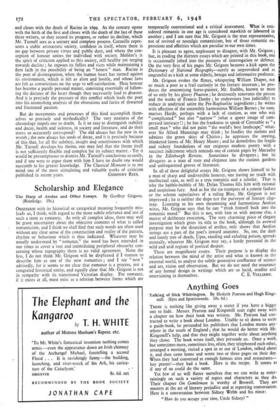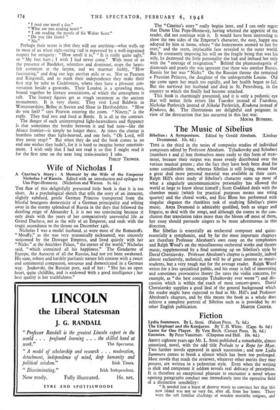Anything Goes
THERE is nothing like giving away a secret if you have a bigger one to hide. Messrs. Pearson and Kingsmill start right away with a chapter on how their book was written. Mr. Pearson had con- tracted to write a book about London. Unable to sit down to write a guide-book, he persuaded his publishers that London means any- where in the south of England ; that he would do better with Mr. Kingsmill's help, and that they might together write about anything they chose. The book wrote itself, they persuade us. Once a week, but sometimes more, sometimes less, often, they telephoned each other, arranged a meeting, visited a spot in or out of London, talked about it, and then came home and wrote two or three pages on their day. When they had conversed at enough famous sites and restaurants— hey presto!—they had a book. Here is the recipe. It 'seems as if any of us could do the same.
Yet few of us will flatter ourselves that we can write as enter- tainingly on such a variety of topics and characters as they do. Their chapter On Gentlemen is worthy of Boswell. They are masters at the art of literary prejudice and at reporting conversation. Here is a conversation between Sidney Webb and his niece:
" How do you occupy your time, Uncle Sidney? " " I read one novel a day." " What are you reading now? "
"I am reading the novels of Sir Walter Scott."
" Do you like them? "
" No.'
Perhaps their secret is that they will say anything—what wells up in most of us when sight-seeing vnd is repressed by a well-ingrained respect for antiquity : " How small it is," " It is really quite ugly," or " My feet hurt ; I wish I had never come." With most of us the presence of Baedeker, relentless and dominant, stops the heart- felt comment at the larynx, and we murmur feebly, "How fascinating," and drag our legs another mile or so. Not so Pearson and Kingsmill, and to mark their independence they make their first trip by tube to Cockfosters, where they have a pleasant con- versation beside a gasworks. Their London is a sprawling mass, bound together by literary associations, of which the atmosphere is talk. The literary figures get as rough treatment as the ancient monuments. It is very elastic. They visit Lord Baldwin in Worcestershire, Belloc in Sussex and Shaw in Hertfordshire. "How do you feel? " says Pearson entering the room. "Ninety," is the reply. They find rest and food at Battle. It is-all in the contract.
The danger of such uninterrupted light-heartedness and flippancy is that sometimes the border between it and bad taste—like the Alsace frontier—is simply no longer there. At times the chatter is heartless rather than light-hearted, and one feels, " Oh Lord, will they never stop? " But when they do and the book comes to an end one wishes they hadn't, for it is hard to imagine better entertain- ment. I wish only that I had not read it so that I might read it for the first time on the next' long train-journey I take.
PHILIP TROWER.































 Previous page
Previous page